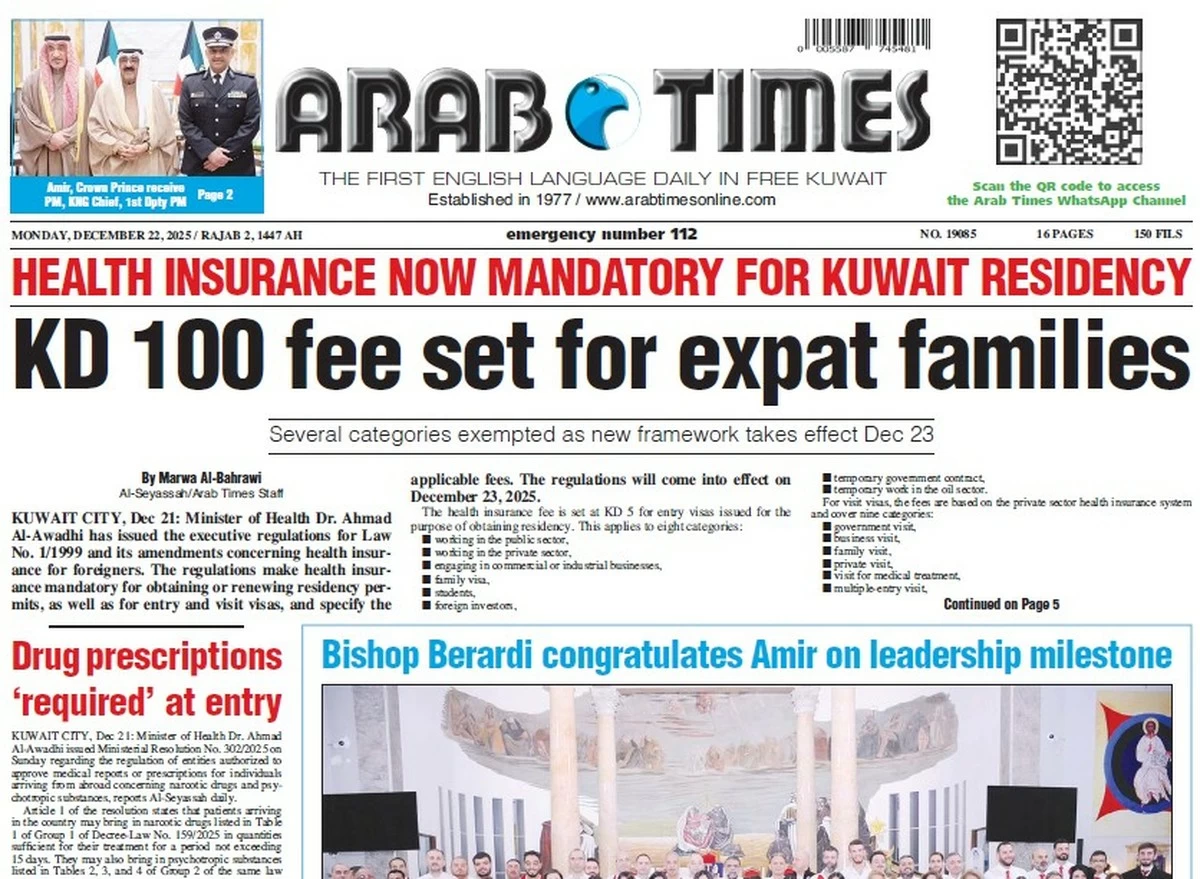16/02/2021
16/02/2021
KUWAIT CITY, Feb 16: His Highness Prime Minister Sheikh Sabah Khaled Al-Hamad Al- Sabah expressed his pain at the damage caused to the owners of Small and Medium-sized enterprises (SMEs) and to the educational attainment of students and the failure of athletes to practice their activities, “but the greater pain is the continuing epidemic situation amid the rise (of cases).”

This came in a speech by His Highness the Prime Minister at the extraordinary session of the National Assembly, held on Tuesday to discuss governmental procedures and policies in dealing with the novel coronavirus (COVID-19) and the mutated strains. “Today we completed a year and we welcome a new one, and now, after 45 days of the new year, we have begun to enter into an alarming situation, as the number of deaths in the past 15 days has reached 50 cases,” said the Premier.
“Occupancy of intensive care beds and hospital admissions has increased largely, as we are heading towards reaching five intensive care units at Mubarak Hospital,” he noted. “We must pause and examine this matter and adhere to what needs to be done. Yes, we suffer from the damage of small and medium enterprises, and we suffer from the damage to our children’s educational achievements, and we suffer when athletes do not practice their activities, but the biggest pain is when we see the situation continues to rise,” he stressed.
“With cooperation, solidarity, understanding, acceptance and implementation, yes, we went through losses, but we passed the stage of ascension, then stabilized, and now we have a second wave. If we do not cooperate, stand together and understand what is required to do, the situation will be difficult for everyone, the whole world has been affected and we must deal with reality,” he continued.
“The readings that the officials had prepared are based on careful follow-ups and analysis that reached conclusions that the executive and legislative authorities must take into account. We all appreciate their hard work and dedication,” His Highness expressed his thanks to the members of the National Assembly for submitting the request to hold this extraordinary session, which shows the interest of the National Assembly in following up the government’s actions towards the pandemic
The special parliamentary session ended with the approval of eight recommendations although 28 MPs boycotted the session. MPs Hesham Al-Saleh, Abdullah Al-Turaiji, Badr Al-Mullah, Yousef Al-Ghareeb, Muhammad Al-Hewaila, Hamad Murei Al-Azmi, Farz Al-Daihani, Salman Al-Azmi, Hamad Saif Al- Harshani, Khalid Ayed, Ali Al-Qattan, Ahmed Al-Hamad and Muhammad Obaid Al-Rajhi presented the following recommendations:
■ The concerned parliamentary committees should complete their reports on proposals to grant compensation to the owners of Small and Medium Enterprises (SMEs) and addressing the negative consequences of coronavirus crisis to pave way for their inclusion in the agenda of the upcoming session.
■ The Cabinet must revise its recent decisions on the suspension of the operation of some commercial establishments and changing the operating hours of other establishments.
■ Form a team of doctors and economists to ensure the decisions are balanced, such that both the economic repercussions and public health are taken into consideration.
■ Form a professional and competent media team to convey the message properly in raising public awareness on the dangers of coronavirus and the importance of strictly complying with the relevant regulations, as well as presenting daily reports which include detailed statistics.
■ Toughen procedures for the entry of expatriates and make sure they have PCR certificates showing negative result.
■ Increase the number of vaccination centers to cover most areas in the country.
■ Expedite the disbursement of the incentive for frontliners — within two months at the latest.
■ Postpone the collection of payments for all types of loans for a period of one year. During the session, interim Minister of Health Dr Basel Al-Sabah and his accompanying team delivered a presentation on the measures that the ministry has been taking since the beginning of the crisis. The interim minister confirmed that almost 454,000 individuals have registered for vaccination — 215,000 citizens and 238,000 expatriates; while the number of those who have been vaccinated reached 138,000 including 119,000 citizens.
In response to the question of MP Saadoun Hammad about the reason behind obligating individuals to undergo quarantine even if they have been vaccinated, the interim minister explained the vaccine is about 90 percent effective which means 10 percent of those vaccinated could still get infected.
Asked why the arriving passengers are not tested at Kuwait International Airport using the kit which takes only 10 minutes to get the results, the interim minister pointed out this test is only 40 percent accurate and it is usually used if the individual is exhibiting symptoms. He affirmed the PCR is still the most reliable test although it takes longer time to get results.
By Saeed Mahmoud Saleh Arab Times Staff and Agencies


